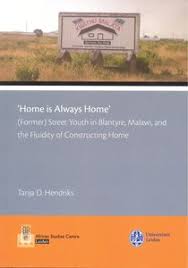Tanja D. Hendriks ~ ‘Home Is Always Home’. (Former) Street Youth In Blantyre, Malawi, And The Fluidity Of Constructing Home
No Comments yet For many Malawians the concept of home is strongly associated with the rural areas and one’s (supposedly rural) place of birth. This ‘grand narrative about home’, though often reiterated, doesn’t necessarily depict lived reality. Malawi’s history of movement and labor migration coupled with contemporary rapid urbanization makes that the amount of people whose lives do not fit this grand narrative, is increasing fast.
For many Malawians the concept of home is strongly associated with the rural areas and one’s (supposedly rural) place of birth. This ‘grand narrative about home’, though often reiterated, doesn’t necessarily depict lived reality. Malawi’s history of movement and labor migration coupled with contemporary rapid urbanization makes that the amount of people whose lives do not fit this grand narrative, is increasing fast.
In the current context of extreme poverty, destitution and devastation – the latter due to the flash floods of January 2015 – slum areas in Blantyre city are growing and so is the number of street children and youth. Some of them are taken in by organizations such as the Samaritan Trust; a street children shelter. This program aims at taking street youth home by ‘reintegrating’ them in their (rural) communities. When asked, the majority of (former) street youth adhere to the grand narrative and state their home to be in a rural village. Yet at the same time, this home is a place they intentionally left and do not wish to (currently) return to. Hence they are generally depicted as ‘homeless’. I wondered: how do (former) street youth in Blantyre, Malawi, engage with ‘the grand narrative about home’ in trying to imagine their ‘becoming at home’ in the city?
My thesis departs from the idea that (the search for) home is an integral part of the human condition. During eight months of ethnographic fieldwork in Blantyre, Malawi, I used qualitative methods – mainly interviews and participant observation – to come to an understanding of the meaning of home for (former) street youth. Some of them, the street girls, currently reside at Samaritan Trust and the former street youth are boys who formerly resided there. Their home-making practices in relation to a marginalized socio-economic position in an overall challenging economic context point towards more fluid and diverse constructions of home that exist alongside the grand narrative without rendering it obsolete. Under pressure, (former) street youth paradoxically attempt to solidify home – even though home remains fluid in practice.
These attempts assist in coping with life in liquid modernity while they are at the same time fraught with contradictions, especially when these solidifications are themselves solidified in policies. These policies subsequently hamper (former) street youth’s becoming at home in town by following the grand narrative and thus confining their homes to rural areas. I conclude that home can best be seen as a fluid field of tensions (re)created in the everyday, thus leaving space for both (former) street youth’s roots and routes. An alternative way in which (former) street youth try to become at home in the city is by searching for a romantic partner to co-construct this (future) home.
This book is based on Tanja D. Hendriks’ Master’s thesis ‘’Home is Always Home’: (Former) Street Youth in Blantyre, Malawi, and the Fluidity of Constructing Home’, winner of the African Studies Centre Leiden’s 2016 Africa Thesis Award. This annual award for Master’s students encourages student research and writing on Africa and promotes the study of African cultures and societies.
Read the book: http://www.ascleiden.nl/home-always-home-former-street-youth-blantyre-malawi-and-fluidity-constructing-home
You May Also Like
Comments
Leave a Reply





